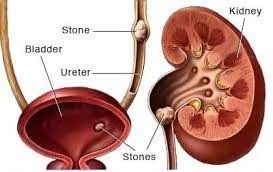Services
We provide quality assured and best treatment facilities to all our patients.
Specialities
Kidney stones (also called renal calculi, nephrolithiasis or urolithiasis) are hard deposits made of minerals and salts that form inside your kidneys.
Passing kidney stones can be quite painful, but the stones usually cause no permanent damage if they’re recognized in a timely fashion.

Symptoms
A kidney stone usually will not cause symptoms until it moves around within your kidney or passes into your ureters — the tubes connecting the kidneys and the bladder. If it becomes lodged in the ureters, it may block the flow of urine and cause the kidney to swell and the ureter to spasm, which can be very painful. At that point, you may experience these signs and symptoms:
- Severe, sharp pain in the side and back, below the ribs
- Pain that radiates to the lower abdomen and groin
- Pain that comes in waves and fluctuates in intensity
- Pain or burning sensation while urinating
- Pink, red or brown urine
- Cloudy or foul-smelling urine
- A persistent need to urinate, urinating more often than usual or urinating in small amounts
- Nausea and vomiting
- Fever and chills if an infection is present
Risk factors
- Family or personal history. If someone in your family has had kidney stones, you’re more likely to develop stones, too. If you’ve already had one or more kidney stones, you’re at increased risk of developing another
- Dehydration. Not drinking enough water each day can increase your risk of kidney stones. People who live in warm, dry climates and those who sweat a lot may be at higher risk than others
- Certain diets. Eating a diet that’s high in protein, sodium (salt) and sugar may increase your risk of some types of kidney stones. This is especially true with a high-sodium diet. Too much salt in your diet increases the amount of calcium your kidneys must filter and significantly increases your risk of kidney stones
- Obesity. High body mass index (BMI), large waist size and weight gain have been linked to an increased risk of kidney stones
- Digestive diseases and surgery. Gastric bypass surgery, inflammatory bowel disease or chronic diarrhea can cause changes in the digestive process that affect your absorption of calcium and water, increasing the amounts of stone-forming substances in your urine
- Other medical conditions such as renal tubular acidosis, cystinuria, hyperparathyroidism and repeated urinary tract infections also can increase your risk of kidney stones
- Certain supplements and medications, such as vitamin C, dietary supplements, laxatives (when used excessively), calcium-based antacids, and certain medications used to treat migraines or depression, can increase your risk of kidney stones
Treatment:
- Treatment for kidney stones varies, depending on the type of stone and the cause.
Large stones and those that cause symptoms:
- Using sound waves to break up stones: extracorporeal shock wave lithotripsy (ESWL)
- Surgery to remove very large stones in the kidney
- A procedure called percutaneous nephrolithotomy involves surgically removing a kidney stone using small telescopes and instruments inserted through a small incision in your back
- To remove a smaller stone in your ureter or kidney, your doctor may pass ureteroscope to your ureter through the urinary passage and break the stone into pieces that will pass in your urine
- Parathyroid gland surgery
Small stones with minimal symptoms:
- Drinking water
- Pain relievers
- Medical therapy: alpha blockers include tamsulosin
Prevention
- Drink water throughout the day
- Eat fewer oxalate-rich foods
- Choose a diet low in salt and animal protein
- Continue eating calcium-rich foods, but use caution with calcium supplements
Emergency Cases
Call / WhatsApp : +91 8660557924 WhatsApp : +91 9994652661
For emergency cases or to get in touch with a doctor from our department, just contact us or fill up the form.
Book Appoinment
Visit Us
Zymus Hospital Address
No.1, K NO. 92, Nanjappa Complex, Kanakapura Rd, Raghuvanahalli, Bangalore City Municipal Corporation Layout, Bengaluru, Karnataka 560062
Menu
Quick Links
Copyright © 2024. Dr Anil Kumar T

